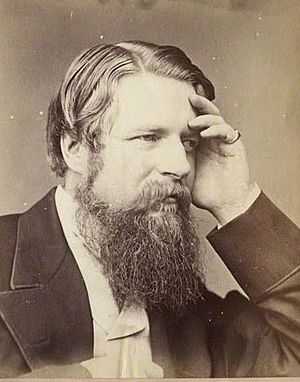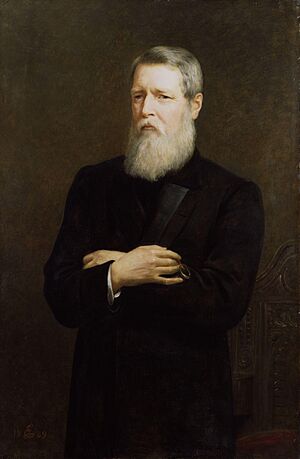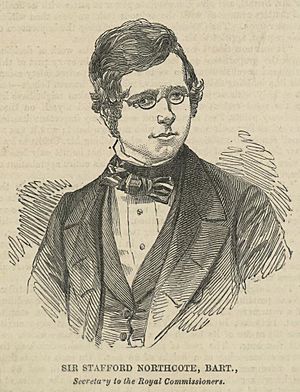Stafford Northcote, 1st Earl of Iddesleigh facts for kids
Quick facts for kids
The Earl of Iddesleigh
|
|
|---|---|

Iddesleigh in 1870s
|
|
| President of the Board of Trade | |
| In office 6 July 1866 – 8 March 1867 |
|
| Monarch | Victoria |
| Prime Minister | The Earl of Derby |
| Preceded by | Thomas Milner Gibson |
| Succeeded by | The Duke of Richmond |
| Chancellor of the Exchequer | |
| In office 21 February 1874 – 21 April 1880 |
|
| Monarch | Victoria |
| Prime Minister | Benjamin Disraeli |
| Preceded by | William Ewart Gladstone |
| Succeeded by | William Ewart Gladstone |
| Secretary of State for Foreign Affairs | |
| In office 3 August 1886 – 12 January 1887 |
|
| Monarch | Victoria |
| Prime Minister | The Marquess of Salisbury |
| Preceded by | The Earl of Rosebery |
| Succeeded by | The Marquess of Salisbury |
| Personal details | |
| Born | 27 October 1818 London, England |
| Died | 12 January 1887 (aged 68) London, England |
| Political party | Conservative |
| Spouse | Cecilia Frances Farrer (died 1910) |
| Children | 10 |
| Alma mater | Balliol College, Oxford |
Stafford Henry Northcote, 1st Earl of Iddesleigh (born October 27, 1818 – died January 12, 1887) was an important British politician. He was a member of the Conservative Party. He held several key government jobs during his career.
From 1851 to 1885, he was known as Sir Stafford Northcote, 1st Baronet. He served as the Chancellor of the Exchequer (in charge of the country's money) from 1874 to 1880. He was also the Foreign Secretary (dealing with other countries) from 1885 to 1886. Some historians describe him as a kind and gentle leader.
Contents
Who was Stafford Northcote?
Early Life and Education
Stafford Northcote was born in London, England, on October 27, 1818. His family had lived in Devon for a very long time. Their family home was called Pynes House, near Exeter.
He went to Eton, a famous school. After that, he studied at Balliol College, Oxford University. In 1847, he became a lawyer, which means he was "called to the bar."
Stafford Northcote's Political Journey
Starting His Career in Government
In 1843, Northcote began working for William Ewart Gladstone. Gladstone was a very important politician. Northcote was his private secretary at the Board of Trade. This board dealt with business and trade in the country.
Later, Northcote became a legal secretary for the same board. He also helped organize the Great Exhibition of 1851. This was a huge event that showed off new inventions and art.
Changing the Civil Service
Northcote worked with Sir Charles Trevelyan on a special report. This report was called the Northcote–Trevelyan Report. It completely changed how people got jobs in the Civil Service. The Civil Service is made up of people who work for the government. Before this report, jobs were often given based on who you knew. The report made it so people had to pass exams to get these jobs. This made the government more fair and efficient.
Becoming a Member of Parliament
In 1851, Northcote became the 8th Baronet after his grandfather passed away. In 1855, he became a Member of Parliament (MP). He represented the area of Dudley.
He later changed the areas he represented. He was elected for Stamford in 1858. In 1866, he became the MP for North Devon. From January to July 1859, he worked as the Financial Secretary to the Treasury.
Key Roles in Government
Northcote was a loyal member of the Conservative Party. He held many important positions:
- In 1866, he became President of the Board of Trade.
- In 1867, he became Secretary of State for India. This role involved managing British India.
- In 1874, he became Chancellor of the Exchequer. This is a very important job, like being the country's chief financial officer.
Working with the Hudson's Bay Company
Between his government roles, in 1870, Northcote was the Governor of the Hudson's Bay Company. This is one of North America's oldest companies. During his time, the company sold a huge area of land called the Northwest Territories to Canada.
Solving International Problems
Northcote was also part of a group that settled the Alabama Claims. This was a disagreement with the United States after the American Civil War. It ended with the Treaty of Washington in 1871.
Leading the Conservative Party
In 1876, Benjamin Disraeli, who was the leader of the Conservative Party, moved to the House of Lords. Northcote then became the leader of the Conservatives in the House of Commons. As Chancellor of the Exchequer, he continued many of the financial plans started by Gladstone. He was known for how he managed the country's debt. He introduced a new "sinking fund" in 1876. This plan helped pay off the national debt in a regular way.
However, some people in his party thought he was too gentle as a leader. Because of this, he was moved to the House of Lords in 1885. He was given the titles Earl of Iddesleigh and Viscount St Cyres. He became First Lord of the Treasury in Lord Salisbury's government.
In 1886, he became Foreign Secretary. Sadly, he died suddenly on January 12, 1887, at 10 Downing Street, the Prime Minister's official home.
Other Important Roles
Northcote was elected a Fellow of the Royal Society in 1875. This is a very respected group of scientists. In 1883, he became Lord Rector of Edinburgh University. He gave a speech there about "Desultory Reading," which means reading widely without a specific plan.
From 1886 to 1887, he was also the Lord Lieutenant of Devon. This is a representative of the King or Queen in a county. He wrote a book called Twenty Years of Financial Policy (1862). This book was a good study of Gladstone's financial ideas. He also wrote Lectures and Essays (1887).
Northcote received several honors for his public service. He was appointed a CB in 1851 and a GCB in 1880. He also became a member of the Privy Council in 1866. This is a group of advisors to the monarch.
He was one of only two people to hold the job of First Lord of the Treasury without ever becoming Prime Minister.
Northcote's Family Life
In 1843, Northcote married Cecilia Frances Farrer. They had ten children together, seven sons and three daughters. His second son, Henry, later became the Governor-General of Australia. Another son, Amyas, became known for writing ghost stories.
Northcote collected some special items from Ethiopia after a British expedition there. These items are now kept in the British Museum. In 1881, the census showed him living next door to another famous politician, Lord Randolph Churchill, in London.
Images for kids
 | James Van Der Zee |
 | Alma Thomas |
 | Ellis Wilson |
 | Margaret Taylor-Burroughs |




